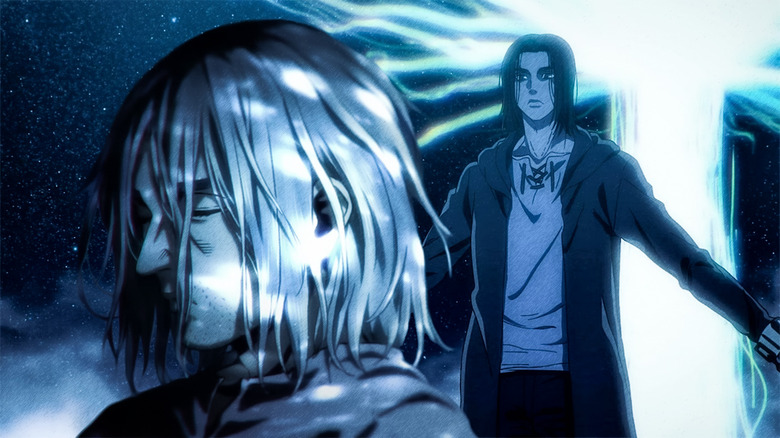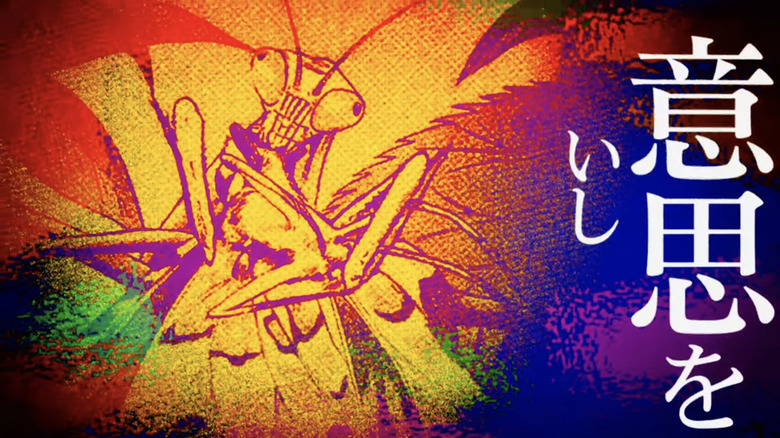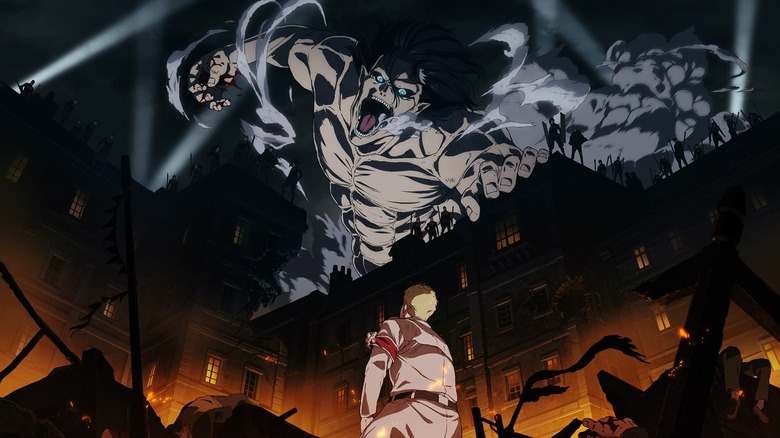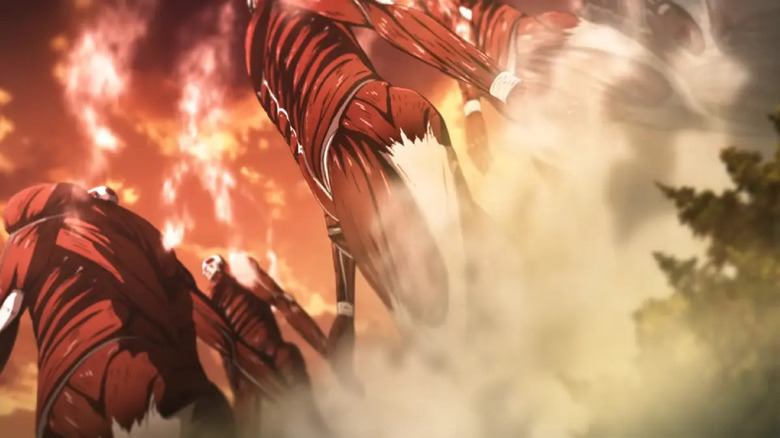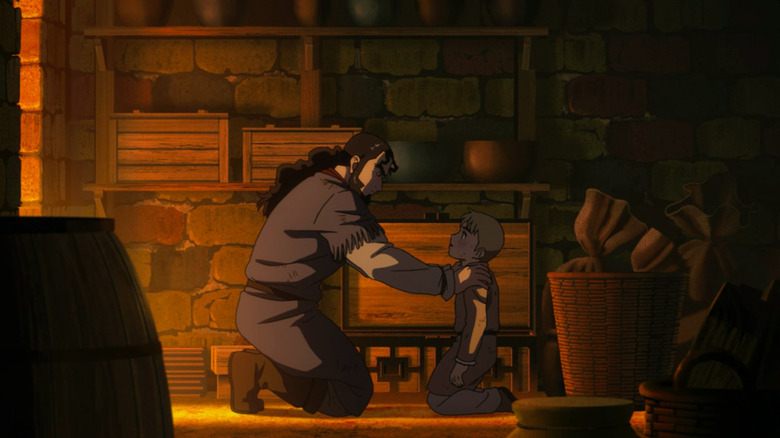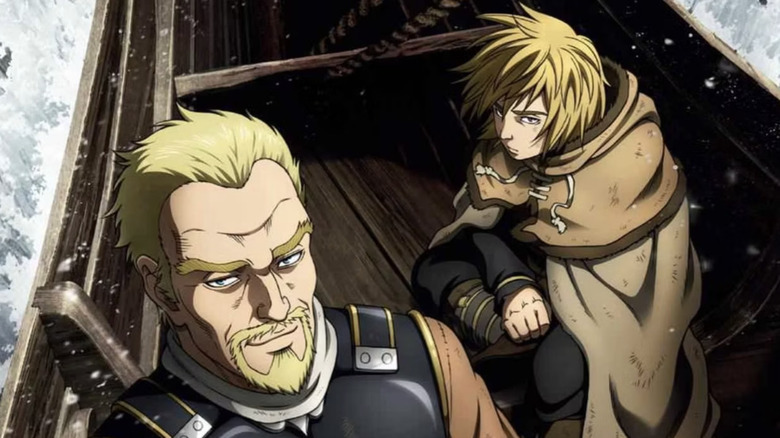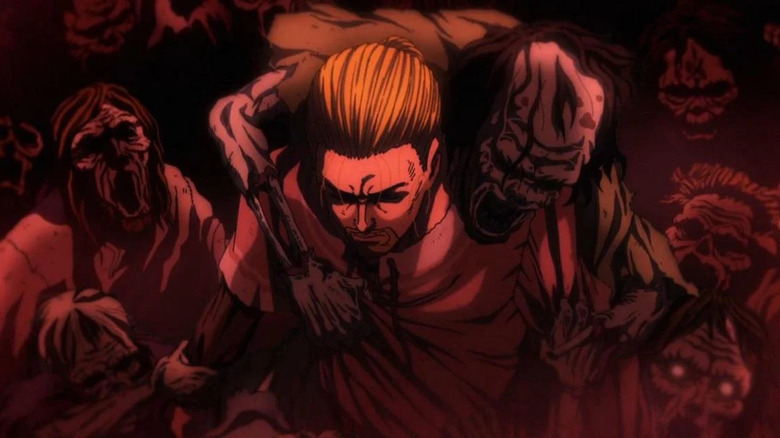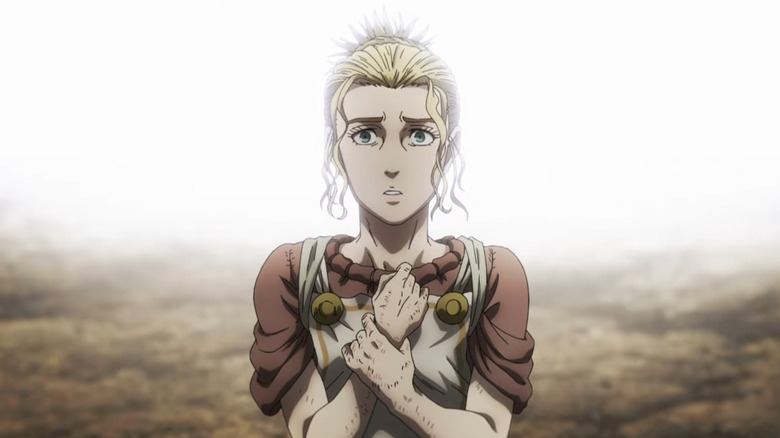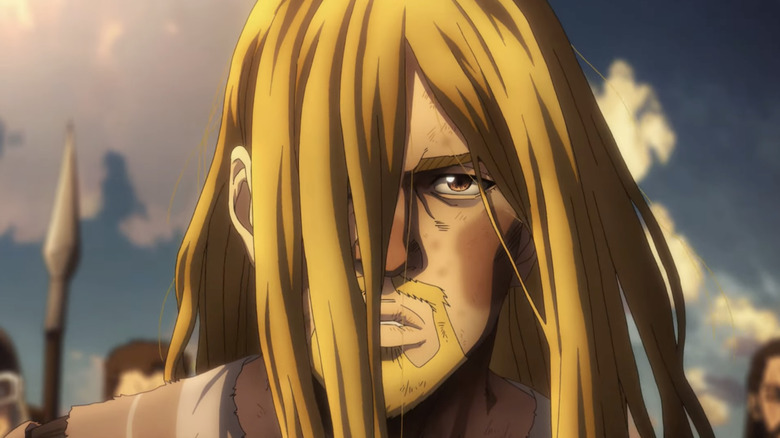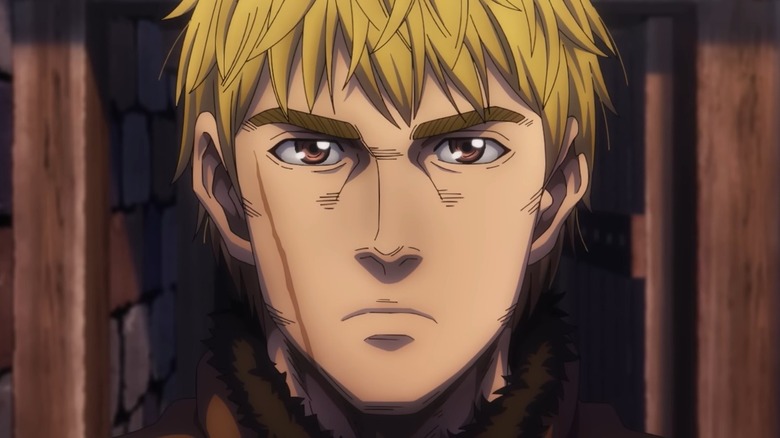The Two Biggest Anime Of 2023 Have The Opposite Message About Violence
Spoilers for "Attack on Titan" and "Vinland Saga" follow.
It's been 10 long years, but the "Attack on Titan" anime has finally ended. Based on Hajime Isayama's manga, the series is colossally popular — so much so that as soon as the finale was made available on October 4, the Crunchyroll servers crashed.
One person who thinks you should watch it? Makoto Yukimura, author of the contemporary manga "Vinland Saga." That series also finished its second anime season this year; "Vinland Saga" season 2 was noted for its meditative tone, which downplayed the action of the first season. Earlier this year, during an interview with Anime News Network, Yukimura was asked about his story's shift. He replied that readers who craved violent storytelling may simply not be the best fit for his work: "You should consider 'Attack on Titan' [instead]."
Now, Yukimura and Isayama are fans of each other's work; they even did a joint interview together in 2022. So, I'm certain this was just a lighthearted joke. That said, it's a pretty perceptive wisecrack, for "Attack on Titan" and "Vinland Saga" are the antithesis of each other.
There are some surface similarities. For instance, in an incredible coincidence of production history, both anime were initially animated by WIT Studio, before switching to MAPPA for their latest season. Both of the worlds these studios have brought to life are violent ones, and both series are about how that bloodshed flows in a cycle. Where Isayama and Yukimura differ, though, is their aims and conclusions in writing about violence.
The hunter and the hunted?
The first title sequence of "Attack on Titan" — "Guren No Yumiya" or "Crimson Bow and Arrow" — opens with a German declaration: "Seid ihr das Essen? Nein, wir sind der Jäger!" Meaning, "Are you the prey? No, we are the hunters!" As the song continues, there's a quick insert shot of a mantis devouring a smaller bug in between the moody hero shots and dynamic action. Even before the audience meets any of the characters, this opening tells us that they live in a dog-eat-dog world.
The series begins as a post-apocalyptic story; flesh-eating Titans roam the land, so humanity must live within circular walled cities. The predator-prey allusions continue when the series' narrator, Armin, compares humans to cattle in pens. In "Attack on Titan," the zero-sum choice to be a hunter or the hunted is a cruel reality. The series is about the heroes, standing strong for humanity's sake, refusing to be prey even for the deadliest predators of all. The lead, Eren Yeager, quickly discovers he has the power to transform into a Titan, literally shifting from hunted to hunter and making the other Titans his prey.
The audience and characters gradually learn more about this world. The big reveal in season 3 is that the Titans are not feral, but tools of an imperial state called Marley. All the Titans are transformed humans, belonging to a race called Eldians. Once the Eldians ruled the world with their power, but the Marleyans overthrew them and confined them to Paradis Island (where the main characters live). However, rather than creating a new, free world, the Marleyans just took the Eldians' place as the oppressors, with enslaved Eldian Titan Shifters as weapons of mass destruction.
The narrative grows more complex, but the theme of the hunter and the hunted survives this twist and carries on to the conclusion.
The hatred of generations
It's long been rumored that Isayama is a Japanese nationalist, due to his praise for Imperial Japanese General Yoshifuru Akiyama and internet posts alleged (though not confirmed) to have been made by him, which downplay the early 20th century occupation of Korea. I've held off from discussing this in my previous writing on "Attack On Titan" — I'm not an expert on Japanese politics and dragging a creator's personal life into analysis can be reductive. All that said; once you view "Attack On Titan" through this lens, it's hard to unsee the allegory.
The Eldians are Japan, once a brutal empire now confined to a small island nation, while Marley is a sum of Japan's colonial victims (or at least a reactionary distortion of them). The Eldian royal family, who always knew the truth, let the Titans roam Paradis and menace their people because their ancestors renounced war — just like Article 9 of the Japanese Constitution. The series portrays this pacifistic vow as a castration and the first half of season 3 is about overthrowing the royal family.
Nationalism is Darwinistic by nature; it proclaims one group of people better than others. In other words, the nationalists are the hunters while their neighbors are the prey. In "Attack on Titan," nationalism is the way of the world, even as empires rise and fall, while prejudice and war stem from historical grievances. It's a tragedy that the characters must suffer because of what happened before they were even born, but like choosing between fighting or being killed instead, it's also a cruel reality.
A Rumbling heard across the Earth
Eren's plan to bring peace? The Rumbling, where he unleashes legions of Titans to trample the world flat — and he succeeds in wiping out 80% of humanity. His ulterior motive, though, was to unite his friends to stop him, in hopes they'd become heroes to whoever was left and the world could start anew.
Armin is horrified by the casualties of Eren's plan, but the anime accepts it as insurmountable. Eren declares the genocide was the "best" plan for peace and Paradis' survival that he could come up with, while Armin assures him they'll burn in Hell together.
With Paradis and the rest of the world now on an even technological playing field, there's a chance for peace. Not a certainty, but a possibility. In a violent world, only violence against a common foe can mend bridges between people who hate each other. Even then, it's ultimately not enough. The end credits of "Attack On Titan" show Paradis being bombed in a future war and close with the implication a new generation of Titans will arise.
In "This Beautiful Cruel World" of ours, life is guided by the impulse to survive and reproduce. The only way to sustain your life and that of your progeny is to take others'.
Must we hunt?
While "Attack on Titan" is speculative fiction, "Vinland Saga" is a historical series, set in the 11th century during the Viking age. It's titled after real Icelandic epics — "Vinland" is what explorer Leif Erikson called North America — though twisted in with a revenge story. The lead character is Thorfinn, son of Thors. Thorfinn's father was once a renowned warrior, with strength comparable to the God of Thunder he's named for. However, he grew disillusioned with a life of plunder — why slaughter men you hold no grudge against? Thors' quest is to become "a true warrior," one who does not need a sword.
Thors tries to pass on his pacificism to Thorfinn, asking the boy to question why he wants a sword. Unfortunately, Thorfinn soon gets his reason when Thors is murdered by a pirate named Askeladd. Thorfinn devotes his life to avenging Thors, following his culture's wishes instead of his father's. What makes this story unique is that, to get his vengeance, Thorfinn joins Askeladd's band; the two make a deal that if Thorfinn proves himself a warrior, Askeladd will duel him one-on-one and offer him the chance for "honorable" revenge.
Since Thorfinn is young, he's also short-sighted. He kills hundreds of men — plenty of them fathers of children, just like Thors — and helps burn whole villages to the ground, all in the pursuit of killing only one enemy. Thorfinn is convinced Askeladd is the dragon he must slay, so other people's lives mean nothing. In a flashback during chapter 119 (not yet adapted to the anime), Thorfinn tells one of his victims, "I'm the hunter, and you're the hunted. That's all there is to it."
It's the same concept as "Attack On Titan," but where "Vinland Saga" disagrees is the idea that the world must be like this.
A boy's two fathers
Thorfinn and Askeladd share one of the most complex character relationships I've ever read or seen. On the surface, they should (and often do) feel only mutual hatred. Still, Askeladd is just as much of a father to Thorfinn as Thors was, even if he leads him down a violent path. As we learn more about him, it's revealed he doesn't enjoy the Viking lifestyle. He saw Thors as someone who had the strength to be the better man that he himself couldn't be. This is why Askeladd sees the teenager Thorfinn has grown into as a selfish idiot — he's no better than any other Viking — but also regrets making him so and, in fleeting moments of mentorship, pushes him to think of a life for himself beyond revenge.
Askeladd ultimately dies in Thorfinn's arms, but not by the boy's hand. Thorfinn becomes hysterical with rage and grief, for he's been denied revenge and once more lost the guiding figure of his life — "You're taking this from me too?!" Yet, Askeladd uses his last breaths telling Thorfinn to grow and be better, to walk the path his father wanted him to.
Discussing Askeladd's all-too-human contradictions and his affection for Thorfinn, Yukimira said they even surprised him:
"When he was on the verge of the end of his life, he made sure Thorfinn didn't come with him [...] And to my surprise, I hadn't thought of him like that right up until I was going to write this scene. They were Askeladd's own words, I can't think otherwise."
These events transpire in the season 1 finale of "Vinland Saga" (corresponding to chapters 52-54 of the manga), titled "The End of the Prologue." With this title, Yukimura pulls back the curtain audaciously; what we thought was the premise was mere set-up.
Chained by the dead
Yukimura didn't set out to write about pillaging Vikings; he wanted Thorfinn to be a "peace-abiding" slave, but his editor shot this idea down. So, he retooled Thorfinn into a warrior to hook readers, then got to tell the story he first conceived in the second arc/season 2. However, the prologue completes the story and Thorfinn's character; the strength of his peaceful convictions is stronger because he knows violence firsthand.
In season 2 of "Vinland Saga," Thorfinn becomes a slave to plantation owner Ketil. By day, he dispassionately clears a forest with his fellow slave Einar, while at night he dreams of the burning and rotting faces of all those he killed. In episode 9, "The Oath," the most terrifying of those dreams sets him on the right path.
He imagines himself falling down a chasm, where at the bottom undead Vikings fight for eternity — a horrifying twist on the image of Valhalla. Guided by a ghostly Askeladd, Thorfinn pulls himself out of this pit, even with the weight of those he killed dragging him down. He swears never to use violence again.
"Vinland Saga" tears through the notion of evil as a sunk cost. Thorfinn will keep carrying the guilt of people's deaths (symbolized by corpses gnawing at him), but that just makes his responsibility to balance the scales even more challenging and vital.
The terrible consequences of war
"Vinland Saga" season 1 was about the victors of the Viking lifestyle, while season 2 is about its victims. Episode 1 focuses on Einar before he meets Thorfinn; his village is plundered, his mother and sister are murdered, and he's hauled off as a slave. In this world, war isn't caused by prejudice like in "Attack on Titan," but by economics and stupid men.
In episode 15, Thorfinn and Einar discuss how war and slavery are a positive feedback loop: the losers of war are made slaves, so warriors go to war because of the demand for slaves. This cruel cycle is personified by Arnheid, Ketil's sex slave; her husband Gardar went off to war and never returned, leaving her village vulnerable. Soon, Vikings came, killed her infant son, and captured her.
In the season's second half, Gardar comes to rescue her but dies himself. Ketil beats Arnheid to death for trying to escape him. "Vinland Saga" is set centuries in the past, but its modern critique of toxic masculinity proves how the following has always been true: if weak men try to prove they're strong by hurting others, the women in their lives suffer. As for the men who triumph in battle? They're slaves too — their masters are sadism, greed, and/or revenge, as Thorfinn can attest. And yet, this culture keeps being passed on from father to son despite the mountains of bodies it's piled up. Thorfinn defying it is what makes his character arc so radical.
'I have no enemies'
It's not only memories of his father or his own sins that push Thorfinn to lead a peaceful life. In episode 13, he overhears a reading from The Gospel of Matthew: "You have heard that it was said, 'You shall love your neighbor and hate your enemy.' But I say to you, love your enemies." Thorfinn takes this adage a step further; why classify people as "enemies" at all? This is a purer Christianity than modern fundamentalism, and Thorfinn soon puts his new beliefs into action.
The climax of the season is Thorfinn's old acquaintance King Canute invading Ketil's farm, intending to seize the land and its wealth to shore up his empire. Thorfinn refuses to fight his way to Canute — hurting others to negotiate for peace is oxymoronic. Instead, he makes a bet to speak with Canute if he can take 100 punches, turning the other cheek with every blow. Drott, Canute's guard, calls the bruised Thorfinn "a true warrior" while looking up at him in awe. He says it because of how tough Thorfinn is, but the audience knows how this means Thorfinn is finally following in Thors' footsteps and developed the strength of will to not hit back.
When Thorfinn gets his face-to-face with Canute, the two men realize their goals aren't that different. Both want a peaceful world, but Canute will create it by ruling it, holding the Vikings' reins with an iron fist to control their bloodlust. Thorfinn, on the other hand, promises to Canute, Einar, and the late Arnheid to create a new land without war or slavery, across the sea in Vinland.
Carving your path
/Film's Danielle Ryan argued last year that "The Boys" and "Peacemaker" are "The Same Story From Different Perspectives" — both shows are about a toxic man with a terrible father, but the former shows a man getting worse while the latter shows one trying to improve. I'd make the same comparison between "Attack on Titan" and "Vinland Saga."
In season 4 of "Attack on Titan," Eren says he'll "keep moving forward" — he won't let anyone stand in his way and will fight to put them down. His arc is about radicalization, how a cruel and unfair world made him into a monster because he couldn't be anything else without getting trampled on.
"Vinland Saga," though, is about "the path of healing and forgiveness." Thorfinn's vow is just as stubborn as Eren's, but his goal is continually striving to be a better person. If someone asked me for a fictional model of healthy masculinity, I would answer with Thorfinn's growth in season 2 and beyond in the manga.
In the U.S. edition of "Vinland Saga" Book Six, Yukimura tells an interviewer he wanted to test himself by writing a manga where the hero eschews violence, and if the result could still be entertaining. While Yukimura's series hasn't concluded yet like Isayama's has, he's already succeeded.
"Attack on Titan" and "Vinland Saga" are streaming on Crunchyroll.
